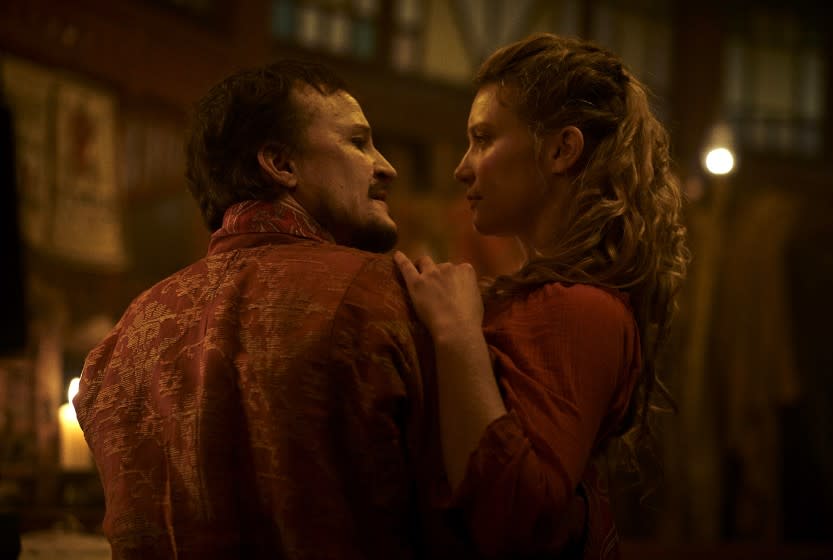Review: In 'Judy and Punch,' a woman wronged gets 17th century-style revenge

Part of Australia’s Blue-Tongue Films collective that also includes Nash Edgerton, Joel Edgerton and David Michôd, Mirrah Foulkes makes her feature debut as writer and director with “Judy and Punch.” If that title feels familiar, indeed it should, a knowing inversion of the classic “Punch and Judy” puppet shows. The movie would like to see itself as a feminist allegory of abuse and systemic oppression, but it comes off as something far more scattered and unfocused.
In the film, Damon Herriman and Mia Wasikowska star as Punch and Judy, who perform a puppet show in a dead-end country town known as Seaside. Judy is far more skilled as a puppeteer, while Punch has a showman’s drive and outsize ego, claiming credit for their work. After vile acts by Punch split their little family apart, Judy finds herself exiled with a group of women in the woods, looking for a way to get her revenge on him.
The world of the film has a stylization reminiscent of the earlier work of Terry Gilliam, with fine work by production designer Jo Ford and costume designer Edie Kurzer, bringing the 17th century town to life. There is a sense of outsize exaggeration to the overall tone, meaning the film often feels more satirically comic than it actually is, undercutting the drama of what is unfolding.
While the timing of the movie’s release date is no fault of the filmmakers, it is hard to imagine anyone right now particularly wanting to watch scenes such as the one in which Punch violently attacks Judy with a cane. Although it is likewise hard to imagine any moment when it would not be difficult to look at the moment’s aftermath, which finds Wasikowska in numerous subsequent scenes made up to have her face severely bruised and battered.
The film feels unbalanced, splitting up the main characters and then spending far too much time with Punch. His shenanigans to cover up his crimes wear thin quickly, as does Herriman’s increasingly desperate mugging for the camera. Wasikowska brings a quieter resolve to her performance, which often plays at odds with the rest of the film.
Many of the film’s larger thematic ideas regarding violence and oppression were dealt with much more forcefully in fellow Australian filmmaker Jennifer Kent’s “The Nightingale,” which also starred Herriman. (The actor also played Charles Manson in both “Once Upon a Time … in Hollywood” and “Mindhunter.”) While “Judy and Punch” is a promising debut for Foulkes as a filmmaker, on its own it falls short.

